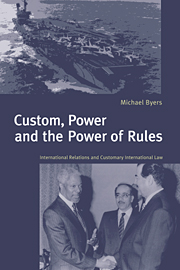Book contents
- Frontmatter
- Contents
- Foreword by James Crawford
- Preface
- Acknowledgments
- Table of cases
- Table of treaties
- List of abbreviations
- Part 1 An interdisciplinary perspective
- Part 2 International law and the application of power
- 4 The principle of jurisdiction
- 5 The principle of personality
- 6 The principle of reciprocity
- 7 The principle of legitimate expectation
- Part 3 The process of customary international law
- Bibliography
- Index
4 - The principle of jurisdiction
Published online by Cambridge University Press: 22 September 2009
- Frontmatter
- Contents
- Foreword by James Crawford
- Preface
- Acknowledgments
- Table of cases
- Table of treaties
- List of abbreviations
- Part 1 An interdisciplinary perspective
- Part 2 International law and the application of power
- 4 The principle of jurisdiction
- 5 The principle of personality
- 6 The principle of reciprocity
- 7 The principle of legitimate expectation
- Part 3 The process of customary international law
- Bibliography
- Index
Summary
Jurisdiction may be defined generally as the authority to engage in activities of control or regulation within a certain geographic area. In international law, jurisdiction appears always to be linked to territory in some way. It is a defining characteristic of statehood and an important point of State interaction. As Huber explained in his judgment as sole arbitrator in the 1928 Island of Palmas Case:
The development of the national organisation of States during the last few centuries and, as a corollary, the development of international law, have established this principle of the exclusive competence of the State in regard to its own territory in such a way as to make it the point of departure in settling most questions that concern international relations.
More recently,Higgins has commented:
There is no more important way to avoid conflict than by providing clear norms as to which state can exercise authority over whom, and in what circumstances. Without that allocation of competences, all is rancour and chaos.
Initially, it might appear that jurisdiction is not so much a principle of international law which may qualify applications of power, as a principle which recognises, and is therefore dependent on, applications of power that result from the absolute control that each State has over its own territory.
- Type
- Chapter
- Information
- Custom, Power and the Power of RulesInternational Relations and Customary International Law, pp. 53 - 74Publisher: Cambridge University PressPrint publication year: 1999



